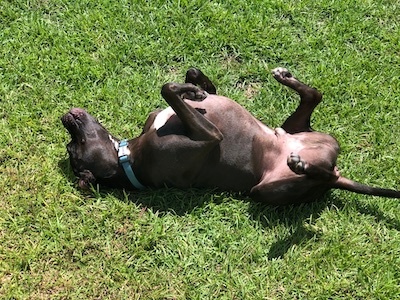
“Respect the individual dog and person. Strive for progress. Provide excellence.”
-Wonder Dog University
IT'S SIMPLE.
WE KNOW MORE NOW ABOUT DOG TRAINING AND BEHAVIOR TO NOT DO BETTER FOR OUR DOGS.
Anyone who closely follows animal behavior topics as a profession can tell you this - anyone who takes it seriously, stays educated on the latest science and is a true professional.
Did you know there's no regulation or law preventing just anyone from calling themselves a "dog trainer?" Scary, right?
Real professional trainers, however, will work hard to become qualified to train dogs. They will work hard to earn professional credentials that they can only acquire through independent certifying organizations, not a private school. Before this, they dedicate themselves to hundreds of hours of hands-on experience and education on how to train dogs using only science based methods. Then they must sit for a written, standardized test, again, by an independent regulating body. They are also required to take continuing education courses regularly to stay current on the latest science of how dogs learn in order to maintain those professional credentials. None of this is required for non-credentialed trainers.
There are some good non-credentialed trainers who decide to take continuing education courses, but without them having credentials, it's hard to know if they do.
So... Why does this matter?
You can't properly serve those in need if you don't stay current on your behavior knowledge, because what we know about animal behavior is changing all the time. Through studies, experience and science, we keep finding out more.
EXAMPLE: THE ALPHA ROLL
This once common training method has long been debunked, yet there are "trainers" who still use it. There's tons of info out there about this, but here's a good overview of why it's no longer recommended by credentialed, professional trainers:
TIME Magazine Article from 2010
TRAINING METHODS HAVE EVOLVED
We used to let the baby cry it out. Now, we know better. Figuring out why the baby is crying and addressing that to stop the crying is smarter and causes no negative behavioral fallout. Behavioral scientists and trainers worth their salt have moved to Modern Training methods. A dog's natural behaviors are reward driven. In other words, animals repeat rewarded behavior. What's not rewarded extinguishes (stops occurring). We use rewards - food, praise, play, access to things they want - to keep the good behavior coming and help dogs truly learn, and faster. Modern Training controls outcomes by guiding dogs toward our preferred behaviors. Negative behaviors are decreased or eliminated by teaching the dog an alternative behavior or providing calm, consequences that are not as rewarding to the dog. It works, plain and simple.
THE MODERN WAY
Old fashioned training attempts to teach a skill like ‘Sit’ by physically pushing a dog into position. Leash "pops" or devices such as choke, prong or electric shock collars (e-collars) were even used. Modern methods eliminate force. In the example of Sit, we teach a dog via Luring or Capturing to repeat the behavior to learn muscle memory that's rewarded. Then we add a verbal cue, ‘Sit.’ Humans forget that dogs don’t speak English. This is why learning the behavior first is important. Animals primarily learn via scent and visual information gathering. Wonder Dog University understands how dogs learn and delivers training your dog can grasp instantly.

-Elizabeth & Henry Bennett with Tusker
I feel like I understand his behavior more and no longer see the need for punishment. We had been trying corrective leashes and collars, had an e-collar we tried for a while, tried to show him that we were "alpha" and none of it was making a difference. Understanding "Trigger Stacking," his "Calming Signals" and trying to eliminate his visual and noise triggers made a big difference! The biggest thing was getting him to not fixate on a trigger - learning how to do that changed everything! Now we know how to stop it. We wouldn't have known about any of these things before. We are pleased with the results and loved working with you!
SO, WHY DON'T ALL TRAINERS USE MODERN TRAINING?
We ask the same question. There are still some skeptics. Some believe forcing a pet to “obey” can get quicker results. Others simply haven't studied the latest science on the subject. Also, it does take knowledge and skill on the trainer’s part to make this simple and seemless for the dog and client.
Honestly, there's a lot of pressure from the average dog owner to provide quick fixes. If a trainer without the desire to gain the knowledge or skill to provide Modern Training wants to thrive as a dog trainer, they usually default to old fashioned methods. With close to twenty years of experience in the field, we can tell you this is often the case. Sadly, right now, anyone can hang out a shingle and say, "I'm a dog trainer." Our hope is regulations will soon be passed requiring anyone calling themselves a dog trainer to attest to being educated in the field. Until then, screen your trainer well, and know there is no reason to use old fashioned training techniques.
Click to read the latest American Veterinary Society of Animal Behavior's position statements including 21 studies cited in their "Humane Dog Training" statement that back this up.
